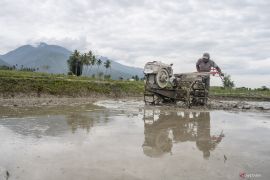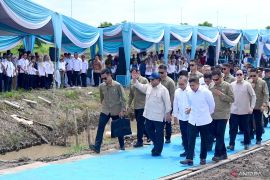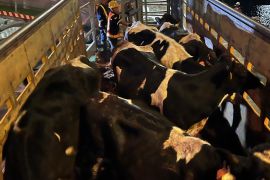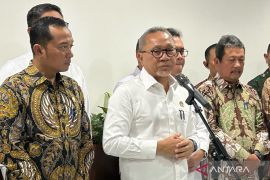Therefore soil fertility restoration programs should be consistently implemented in a bid to increase food production and achieve self-sufficiency in food.
On Monday, a non-governmental organization (NGO) advocating preservation of soil fertility (PKL) demanded that the government and the House of Representatives (DPR) consistently implement soil fertility restoration programs as a prerequisite to increase food production.
"Farmers consider the consistent implementation of soil fertility restoration programs essential to increase food production and achieve food self-sufficiency," PKL spokesman Henry Suryo said here on Monday.
According to him, soil fertility restoration programs would also help strengthen national food security.
Indonesia today is confronted by the challenge of food security for its population of 237.6 million people, the fourth world most populous country.
Although the country is producing enough staple food for its people, Henry said that amid the threat of a world food crisis, around 5 million hectares or 60 percent of a total 7.9 million hectares of farmland are damaged due to excessive use of non-organic fertilizers
Therefore, he noted that the farmers also wanted the government to immediately intervene and directly enlighten the community regarding the potential impacts of excessive use of chemical fertilizers.
"It is also necessary for the government to promote the use of alternative ways of fertilizing soil, such as resorting to organic fertilizer, for instance, compost made of straw which is widely available," he said.
Henry said using straw-based compost as an organic fertilizer could be part of the government`s effort to the land degradation degradation due to declining soil fertility.
The Agriculture Ministry had initiated a program to promote the use of organic fertilizers in 2010, but he said that ironically, even before the program could fully take off, there were already indications of attempts to undermine it by certain quarters with a vested interest in derailing the national food self-sufficiency and security efforts.
In PKL`s view, he said, there was a "neoliberal agenda" behind the efforts to thwart the soil fertility restoration programs and the country`s efforts to increase food production, namely to let Indonesia remain a market for imported food commodities.
"Soil fertility restoration is a populist economic program and should become a national priority. Therefore, the House of Representatives should encourage the government to implement it consistently in order to ensure food security," he said.
Meanwhile, Agriculture Minister Suswono said recently that improving the accuracy or validity of statistical data on agriculture could greatly help the country in ensuring its food security during the current global crisis.
"One of my priorities is the management and improvement of food-related data as a way to solve our food security problem," the minister said at a Businessmen-Government Discussion Forum on Food early this month.
The minister noted that collection of accurate agricultural statistical data was important for business makers to have certainty amid the current global crisis.
Suswono said he had heard complaints from many farmers about their difficulties in obtaining corn for animal feed while in reality, according to existing statistical data, there was enough corn in the country.
Besides, he said, based on the results of audits carried out recently, farm lands in Java totaled 13.5 million hectares but according to data from the National Board of Land Affairs (BPN) five years ago it was 4.1 million hectares.
"If the data is accurate, it means that an incredibly large part of farm land has been converted into land for other purposes," the minister said.
Suswono also said his ministry`s policies in the agricultural sector against climate change were among others to widen the area of cultivation lands by utilizing suboptimal lands, to increase cropping index of irrigated land and optimal land, to mobilize field officers and skilled human resources, and to improve the effectiveness of management system and dissemination of information.
"Food security means giving priority to satisfying domestic needs, but what matters to the people is that food should be available and accessible," the minister said.
To assist the development of national food products and security, PT Saraswanti Indo Genetech (SIG), the first Indonesian molecular biotechnology company, has established a food laboratory to to test and analyze genetically modified products.
Ministry of Agriculture Secretary General Hari Priyono said in Bogor, West Java, on Monday that the food laboratory was expected to gain an international accreditation.
He said the international accreditation was needed by the laboratory of PT SIG in its effort to assist the development of national food products and security.
At a function to dedicate the new building of PT SIG in Bogor, Hari said Indonesia at present did not have internationally-accredited food laboratory and thus most exported food products were tested overseas.
"That is certainly detrimental to us if our food products for export are rejected," Hari said, expressing hope that the new largest private food laboratory in Indonesia could meet these needs.
He expressed confidence that with existing facility, supported by qualified human resources, the food laboratory could meet this challenge, and therefore international accreditation was needed.
"For the first process it can be started with the accreditation of Australia, China, and the European Union," Hari said, adding that agriculture remained an important pillar of Indonesia`s economy.
Therefore he noted that the agriculture should be supported by a credible and internationally-recognized food laboratory.
(O001)
Reporter: Otniel Tamindael
Editor: Aditia Maruli Radja
Copyright © ANTARA 2011











